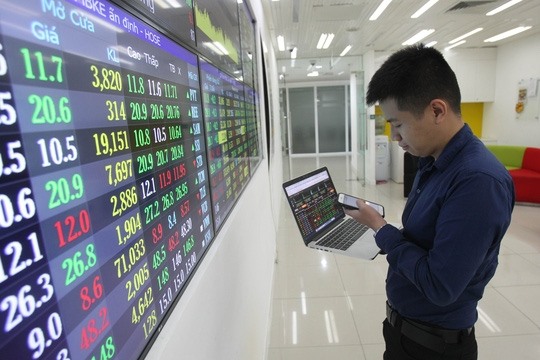 Economy
Economy


|
| An investor follows stock movements on a trading floor in Hà Nội. What is really bothering investors now is less the surge in cases of the illness but how severely the businesses have been impacted. — Photo theleader.vn |
HÀ NỘI — Investors may want to prepare for choppy trading this week as the market is still vulnerable to the unpredictability of global shocks inflicted by the COVID-19 pandemic, said analysts.
The benchmark VN-Index on the Hồ Chí Minh Stock Exchange edged up 0.27 per cent to close Friday's session at 696.06 points.
The southern market index lost 1.95 per cent last week.
An average of 269 million shares were traded during each session on the southern market last week, worth VNĐ4.5 trillion (US$193.4 million).
The VN-Index is forecast to experience alternate ups and downs between 653-720 points next week, according to Bảo Việt Securities Co.
“The market could possibly fluctuate wildly early next week and drop to 653-673 points,” the company said.
“Although the market witnessed more positive trading late last week, this short-term nascent rallies are typically not the start of a durable recovery,” said Nguyễn Anh Khoa, specialist at Agribank Securities Co (Agriseco).
The benchmark VN-Index recorded its largest one-day percentage gain in eight years last Wednesday, up 4.71 per cent.
“Next week, the market can decline or increase sharply with the probabilities of the two cases being equal, depending on the control of the COVID-19 pandemic in Việt Nam and around the world,” Khoa told tinnhanhchungkhoan.vn.
“The Vietnamese market has fallen by nearly 28 per cent since the beginning of the year and 32 per cent from the nearest peak, which is indicative of an early bear market,” said Ngô Quốc Hưng, senior analyst at MB Securities Co's market strategy department.
“Although the domestic market experienced three consecutive gaining sessions last week thanks to the recovery trend of regional and global markets, investors still trade with caution,” Hưng said.
“In the context that investors around the world are constantly selling all their assets to hold cash, it is questionable whether the massive gain last week will put an end to recent staggering selloff or make a start for further losses?” Hưng said.
“The steep market drops recorded lately are unprecedented experience of the global economy and the stock markets around the world,” Hưng said.
“For me, what is really bothering investors now is less how fast the surge in cases of the illness but how severely the businesses have been impacted,” said Nguyễn Hữu Bình, head of analysis at Vietnam Investment Securities Co.
“They have realised more clearly the damages inflicted by the pandemic and acknowledged that Q2 economic results can become more serious compared to the newly-released Q1 figures,” Bình said.
According to the General Statistics Office, Việt Nam's GDP growth in the first quarter of 2020 is estimated to increase by only 3.82 per cent year-on-year, the lowest in the past 10 years. Three economic sectors experienced a sharp decline in growth, including agriculture-forestry-fishery, construction and service.
Bảo Việt Securities Co said in its daily report that Q1 GDP growth was much lower than the preliminary forecasts in early February.
“However, this is not a surprise for investors amid the COVID-19 pandemic. We believe that with the Government’s drastic social distancing measures since late March 2020, GDP growth will continue to be strongly affected in the second quarter, especially in service,” the company said.
“The number of infected people in the US and Europe is also skyrocketing, making global market sentiment more gloomy. Few believe the volatility in markets has ended as the outbreak’s trajectory remains uncertain,” Bình said.
On the US market, after a slump into bear market territory, the Dow Jones Industrial Average surged over 20 per cent from its brutal loss last week, which showed signs of a new bull market.
“But that definition, however, should be treated with significant caution,” Bình said.
On the Hà Nội Stock Exchange, the HNX-Index declined 0.47 per cent to close Friday at 97.35 points.
The northern market declined 4.36 per cent last week.
Nearly 57.4 million shares were traded on the northern bourse, worth VNĐ528 billion. — VNS




